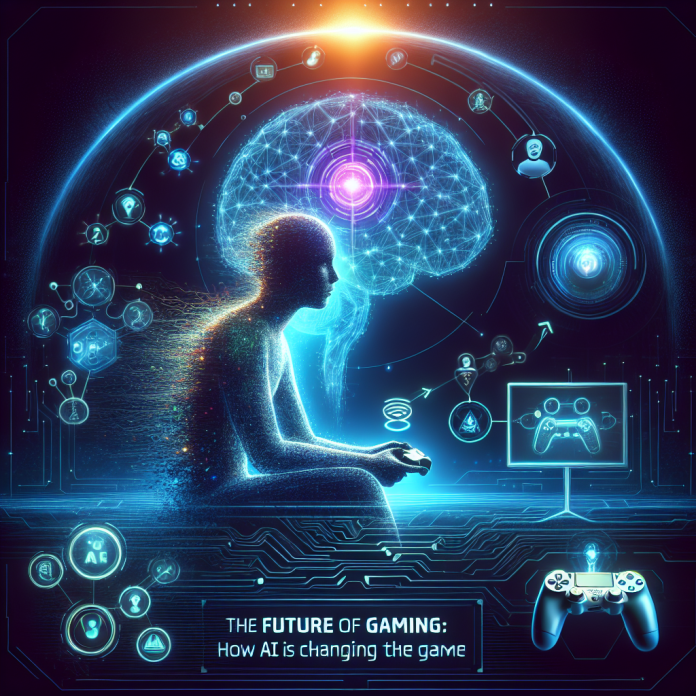Artificial intelligence, or AI, is revolutionizing the gaming world in ways we could have never imagined. From enhancing gameplay experiences to creating more immersive environments, AI has become a crucial component in the development of today’s most popular video games. In this article, we will explore the role of AI in the gaming world, how it is shaping the industry, and what the future holds for this exciting technology.
### The Evolution of AI in Gaming
Gaming has come a long way since the days of simple 2D platformers. With advancements in technology, game developers have been able to create more complex and realistic worlds for players to explore. AI has played a major role in this evolution, allowing for more dynamic and intelligent interactions within games.
In the early days of gaming, AI was limited to basic functions such as enemy movement patterns or obstacle avoidance. However, as technology has advanced, AI has become more sophisticated, with the ability to adapt to player behavior and provide more challenging and engaging gameplay experiences.
One of the key advancements in AI technology has been the development of neural networks and machine learning algorithms. These algorithms allow AI to learn from past experiences and improve its decision-making skills over time. This has led to the creation of AI characters that can adapt to different play styles, offering a more personalized and dynamic gaming experience.
### AI and Game Design
AI is not only used to enhance gameplay experiences for players but also to assist game developers in designing more immersive and engaging worlds. AI algorithms can help create realistic environments, intelligent NPCs (non-playable characters), and dynamic storylines that react to player actions.
For example, in the popular game “The Witcher 3: Wild Hunt,” AI is used to create a living, breathing world that reacts to the player’s choices and actions. NPCs have their own schedules and behaviors, and the world changes based on the player’s decisions, creating a truly immersive experience.
### AI-driven Game Mechanics
AI is also being used to drive game mechanics in new and exciting ways. One example of this is procedural generation, a technique that uses AI algorithms to create randomized game content such as levels, quests, and items. This allows for endless replayability and keeps players engaged for longer periods of time.
Another way AI is being used in game mechanics is through adaptive difficulty systems. These systems analyze player behavior and adjust the difficulty of the game in real-time to provide a more challenging and enjoyable experience. This ensures that players of all skill levels can enjoy the game without feeling frustrated or bored.
### The Future of AI in Gaming
As AI technology continues to advance, the possibilities for its use in the gaming world are endless. We can expect to see even more realistic and immersive game worlds, intelligent NPCs, and dynamic gameplay experiences in the future.
One area where AI is expected to make a significant impact is in virtual reality (VR) and augmented reality (AR) games. AI algorithms can help create more realistic and responsive virtual worlds, making the gaming experience even more immersive and engaging.
Additionally, AI-driven games are likely to become more personalized and adaptive to individual players. By analyzing player behavior and preferences, AI can create custom-tailored gaming experiences that cater to the player’s unique style and preferences.
### Real-life Examples
One real-life example of AI’s role in the gaming world is Google’s DeepMind AI, which made headlines in 2016 for beating the world champion Go player. This breakthrough showed the potential of AI to excel at complex and strategic games, leading many to speculate on the future of AI in the gaming industry.
Another example is NVIDIA’s AI-powered game development tool, which uses machine learning algorithms to help developers create more realistic and dynamic game worlds. This tool allows for easy integration of AI-driven elements such as intelligent NPCs, realistic physics simulations, and adaptive difficulty systems.
### Conclusion
AI’s role in the gaming world is only going to continue to grow in the coming years. With advancements in technology and the development of more sophisticated AI algorithms, we can expect to see even more immersive and engaging gameplay experiences that push the boundaries of what is possible in the gaming industry.
As AI continues to evolve, game developers will have even more tools at their disposal to create truly unique and innovative gaming experiences. Whether it’s through more realistic game worlds, intelligent NPCs, or adaptive difficulty systems, AI is shaping the future of gaming in exciting and unexpected ways. So buckle up, gamers, because the future of gaming is going to be driven by AI.

